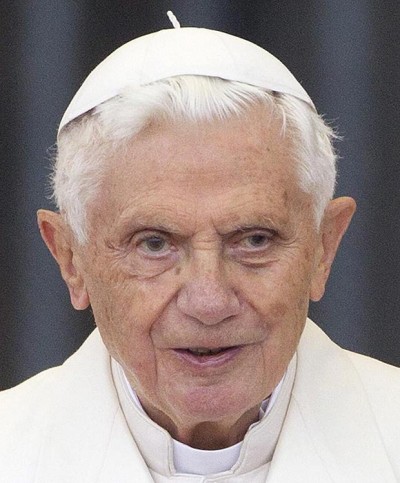Love, Sorrow, and the Encounter with the Divine
 On Monday last, 6 July 2015, at Castel Gandolfo, Pope Benedict XVI was honoured with a Doctorate Honoris Causa from the John Paul II Pontifical University of Krakow and from the Academy of Music of Krakow, Poland. Cardinal Stanislaw Dziwisz, archbishop of Krakow and Grand Chancellor of the John Paul II Pontifical University, conferred the two degrees. In his discourse of acceptance, Pope Benedict XVI said:
On Monday last, 6 July 2015, at Castel Gandolfo, Pope Benedict XVI was honoured with a Doctorate Honoris Causa from the John Paul II Pontifical University of Krakow and from the Academy of Music of Krakow, Poland. Cardinal Stanislaw Dziwisz, archbishop of Krakow and Grand Chancellor of the John Paul II Pontifical University, conferred the two degrees. In his discourse of acceptance, Pope Benedict XVI said:
The Origin of Music
It is right, perhaps, to pose the basic question: What is music in reality? From where does it come and what does it tend to? I think that three “places” can be localized from which music flows.
Love
One of the first sources is the experience of love. When men are seized by love, a new dimension of being opens in them, a new grandeur and breadth of reality, and it also drives one to express oneself in a new way. Poetry, singing and music in general stem from this being struck, by this opening of oneself to a new dimension of life.
Sorrow
A second origin of music is the experience of sadness, being touched by death, by sorrow and by the abysses of existence. Opened also in this case, in an opposite direction, are new dimensions of reality that can no longer find answers in discourses alone.
Encounter with the Divine
Finally, the third place of origin of music is the encounter with the divine, which from the beginning is part of what defines the human. All the more so here in which the totally other and the totally great is present, which arouses in man new ways of expressing himself. Perhaps, it is possible to affirm that in reality also in the other two ambits – love and death – the divine mystery touches us and, in this sense, it is the being touched by God that, overall, constitutes the origin of music. I find it moving to observe how, for instance, in the Psalms singing is no longer enough for men — an appeal is made to all the instruments: reawakened is the hidden music of creation, its mysterious language. With the Psalter, in which the two motives of love and death also operate, we find directly the origin of sacred music of the Church of God. It can be said that the quality of the music depends on the purity and the grandeur of the encounter with the divine, with the experience of love and of pain. The more pure and true this experience is, the more pure and great also is the music that is born and develops from it.
The Christian Faith and Music
At this point, I would like to express a thought that has gripped me increasingly, all the more so in as much as the different cultures and religions enter into relation among themselves. Present in the ambit of the different cultures and religions is great literature, great architecture, great painting and great sculptures. And everywhere there is also music. And yet in no other cultural ambit is there music of equal grandeur to that born in the ambit of the Christian faith: from Palestrina to Bach, to Handel, up to Mozart, Beethoven and Bruckner. Western music is something unique, which has no equal in other cultures. And this – it seems to me – should make us think.
Music: A Demonstration of the Truth of Christianity
Certainly, Western music goes beyond by far the religious and ecclesial ambit. And yet it finds its most profound origin, in any case, in the liturgy of the encounter with God. In Bach, for whom the glory of God represents ultimately the end of all music, this is altogether evident. The great and pure answer of Western music was developed in the encounter with that God that, in the liturgy, makes himself present to us in Christ Jesus. For me, that music is a demonstration of the truth of Christianity. Wherever such an answer is developed, there has been an encounter with truth, with the true Creator of the world. Therefore, great sacred music is a reality of theological rank and of permanent meaning for the faith of the whole of Christianity, even if it is not necessary that it be performed always and everywhere. On the other hand, however, it is also clear that it cannot disappear from the liturgy and that its presence can be an altogether special way of participation in the sacred celebration, in the mystery of the faith.
Beauty from Truth
If we think of the liturgy celebrated by Saint John Paul II on every continent, we see all the breadth of the expressive possibilities of the faith in the liturgical event; and we also see how the great music of the Western tradition is not foreign to the liturgy, but is born and grows from it and in this way contributes ever again to give it form. We do not know the future of our culture and of sacred music. However, there is something that seems clear to me: where there is really an encounter with the living God who comes to us in Christ, born and growing there again is the answer, whose beauty comes from truth itself.
[Original text in Italian, translation by Zenith]
